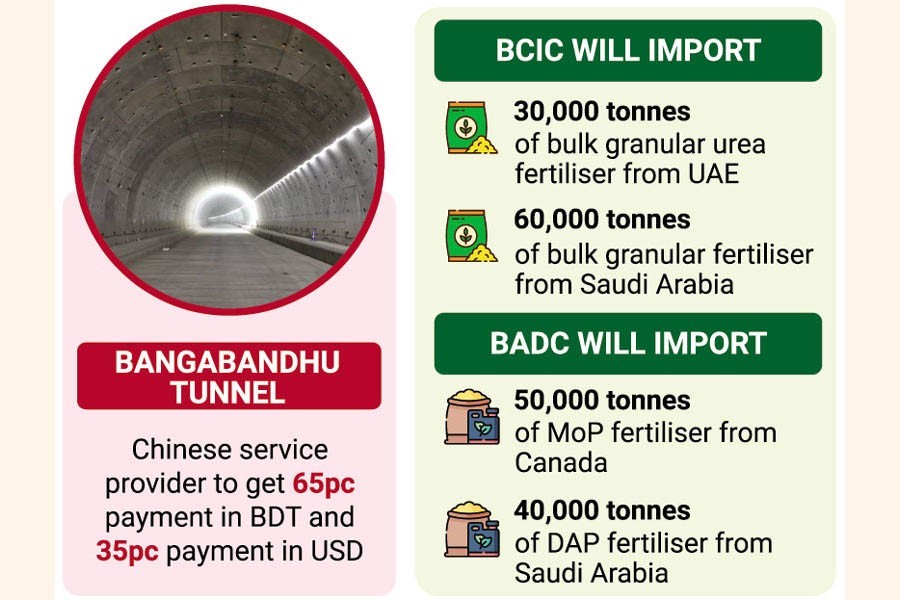The government will buy 180,000 tonnes of fertilisers from three countries, as fertiliser demand is on the rise amid local production fall - due to shortage in gas supply to the fertiliser factories.
The Cabinet Committee on Government Purchase, in a virtual meeting on Wednesday - chaired by Finance Minister A H M Mustafa Kamal, gave its approval.
The consent came following another approval for procurement of 160,000 tonnes of fertilisers, given last week. On November 3, the cabinet committee also gave approval for buying 115,000 tonnes of fertilisers.
Officials said Bangladesh meets most of its fertiliser needs through import, mainly from the Middle-East region, under government to government (G2G) arrangement.
However, with the country's foreign currency reserve going down significantly in the recent months, opening letters of credit (LCs) for importing fertilisers has been facing delay, as the banks do not have required US dollars to make the payments, they also said.
Prime Minister Sheikh Hasina in a recent meeting with the government's secretaries, in presence of the central bank governor, asked all to ensure that import of fertilisers and food items does not face any obstacle due to the dollar shortage.
The governor was asked to expedite LC opening, so that food production and food supply situation remain normal.
The officials also said fertiliser prices are going down in the international market. So, Bangladesh is getting the agri-input at low prices this week compared to the previous weeks - ahead of the Boro cultivation season.
Briefing newsmen after the meeting, Cabinet Division Additional Secretary Sayed Mahbub Khan said the Bangladesh Chemical Industries Corporation (BCIC) will buy 30,000 tonnes of bulk granular urea fertiliser from Fertiglobe Distribution Limited of the UAE at a cost of Tk 1.89 billion.
The corporation will also import 60,000 tonnes of bulk granular fertiliser from SABIC Agri-nutrients Company of Saudi Arabia in two separate lots at a cost of Tk 3.78 billion.
Moreover, the Bangladesh Agricultural Development Corporation (BADC) will import 50,000 tonnes of Muriate of Potash (MoP) fertiliser from Canada at a cost of Tk 4.16 billion, he also said.
The BADC will also import 40,000 tonnes of Diammonium Phosphate (DAP) fertiliser from Saudi Arabia at a cost of Tk 3.08 billion.
The cabinet committee also approved import of 30,000 tonnes of phosphoric acid from the UAE for the DAP Fertiliser Company Ltd under the BCIC at a cost of Tk 2.15 billion.
Besides, the committee endorsed a proposal of the Bangladesh Bridge Authority to pay 65 per cent of the payment in Bangladesh currency and the remaining 35 percent in foreign currency (US dollar) to the Chinese service provider of the Bangabandhu Sheikh Mujibur Rahman Tunnel.
Earlier, the Chinese CCCC was appointed as its service provider at a cost of Tk 9.838 billion for five-year tenure. It will collect toll from the tunnel-using vehicles and also conduct its operation and maintenance work.
Under the new approval, the company will annually get Tk 6.569 billion (as 65 per cent of the payment) in local currency and $35.162 million (equivalent to Tk 3.268 billion) in US dollar.
Besides, the Ideal Electrical Enterprise Ltd of Bangladesh was awarded a work on development of electricity distribution system in Mymensingh zone, which will cost the exchequer Tk 1.02 billion, said the additional secretary.
According to the officials, in absence of required gas supply, at least three fertiliser factories have been inoperative for months. On Tuesday, the Petrobangla supplied only 164 mmcfd of gas for fertiliser production against the demand for 316 mmcfd.
Amid severe price hike of liquefied natural gas (LNG) in the international market, followed by US dollar price hike and fall of foreign currency reserve, the government suspended LNG import from the spot market in July, causing the supply crunch.
It also lowered gas supply to the fertiliser factories that decreased production and enhanced import dependency further, they added.


